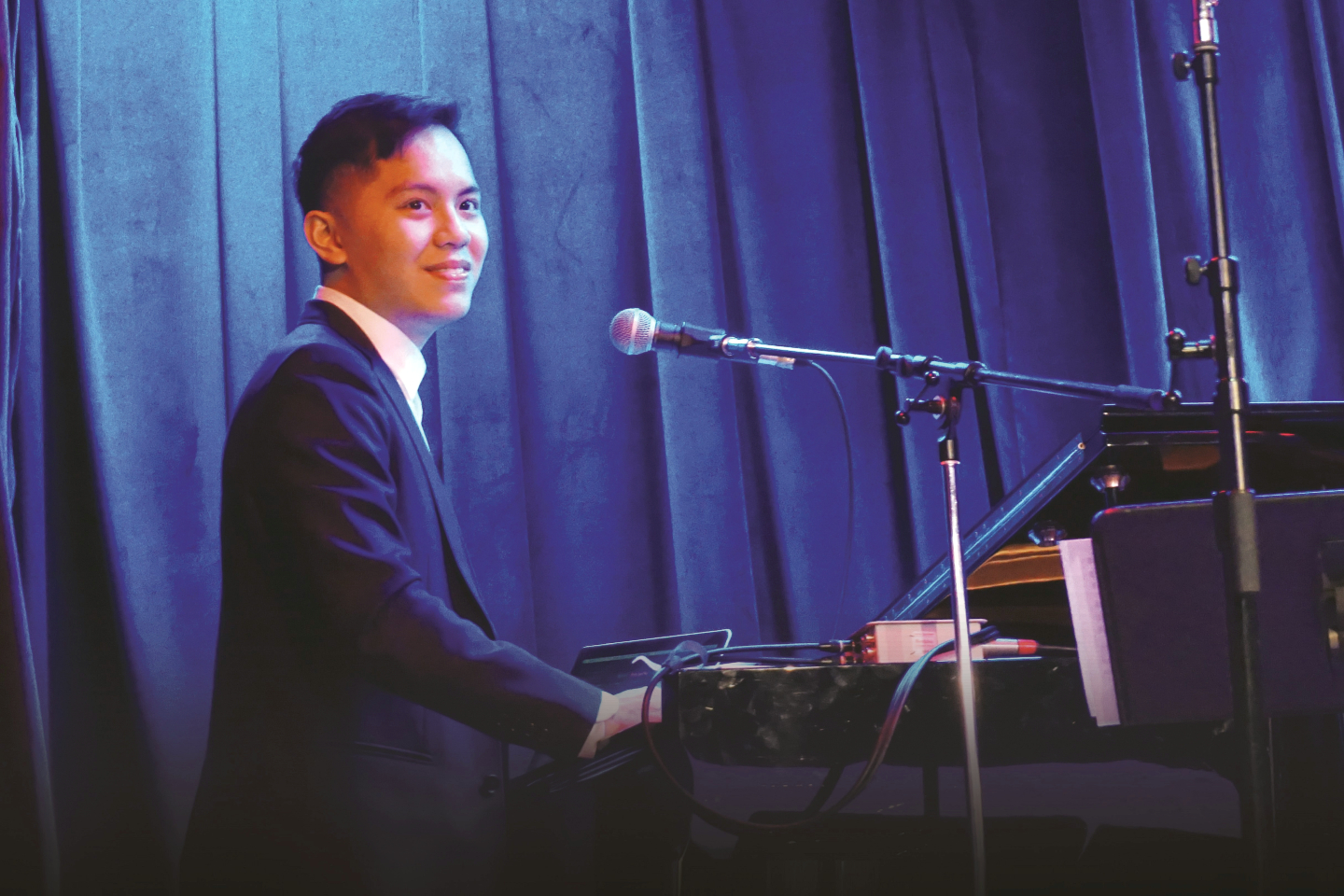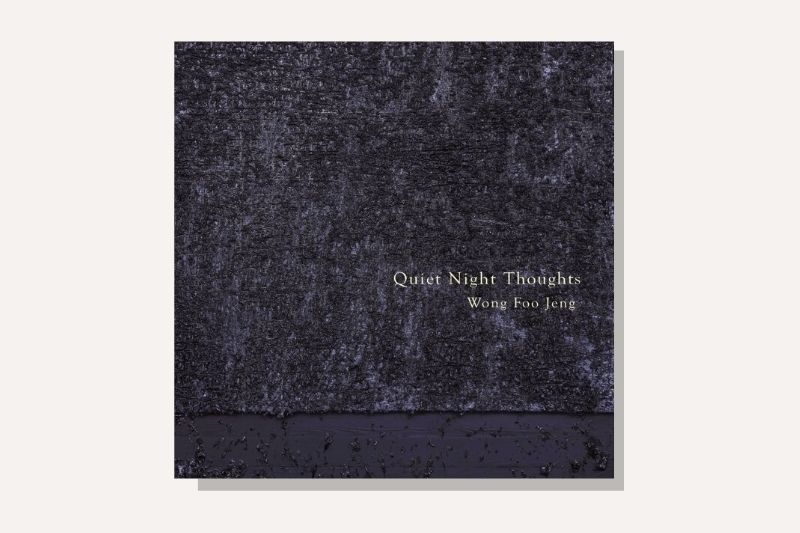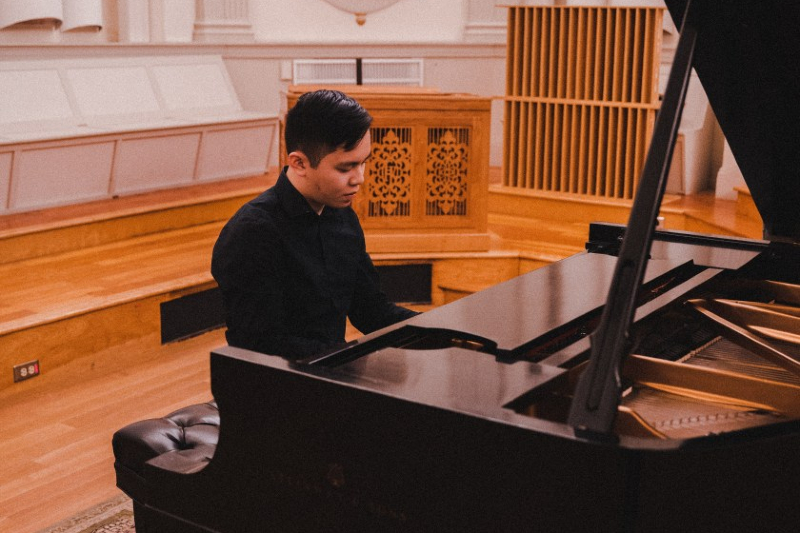
Wong says the process of Quiet Night Thoughts has been an exercise of translating his stories into a more poetic narrative (All photos: Wong Foo Jeng)
If jazz is a language, Wong Foo Jeng speaks it with an exuberance befitting his youth. Interestingly, the 23-year-old Berklee College of Music graduate chose a contemplative tone for his debut album, which is aptly titled Quiet Night Thoughts.
But while the trombone’s mellow first notes in the opening song, A Prayer in Spring, heralds the night and its quiet solitude, the inner world of the artist comes alive gradually. In the six original compositions, five written by Wong and one by his fellow Berklee schoolmate, Japanese musician Eri Chichibu, we delve into the myriad of thoughts, emotions and presence of someone who is sharing his moments of solitude with the world.
It feels private yet universal — an easy-listening album that is nevertheless refreshing in its well-thought-out candour.
Wong shares his experience of learning and playing in Boston. “I have been constantly writing music these few years and, of course, a lot of musicians would give me technical feedback, whereas non-musicians would say, ‘Oh, it sounded very weird, I don’t really understand what you’re doing, but it sounds cool’.”
quiet_night_thoughts.jpg

It made him aware that creating accessibility to music is important, even if he wields all the compositional techniques in his vocabulary. He recalls learning about the American composer John Cage, who was driven by the purity of “organising sound” in music, discarding the deliberation of meaning or feeling.
“There’s nothing wrong with that kind of music and, as a composer, focusing on the technical aspect is part of my work. But what happens also is that it can become disconnected from the human experience,” Wong says.
Perhaps owing to the value of tradition in Asian culture, he believes that knowing your roots is part of what it is to be human, even in music. “Also, during my studies, I was very inspired by the history of jazz music in particular and its lineage of composers.”
On the other hand, working with the belief that as individuals, we “all have something to say”, Wong says the process of Quiet Night Thoughts has been an exercise of translating his stories into a more poetic narrative. “I hope it can impart something of value to the listener.”
Like many Malaysians who have lived abroad, a large part of Wong’s life (and music) experiences come from navigating the tensions of East and West. The album itself was inspired by a period of transition, when he came home after graduating with his performance degree.
“I wrote this album in January, and it took a month. I then went back to Boston to record it in March with musicians who were either my schoolmates or people I met through my work there,” shares Wong. He is based in Kuala Lumpur now, having deferred his Master of Arts in composition at the Manhattan School of Music to next year.
Being back made him contemplative of his experiences and he drew a parallel to the Chinese poet Li Bai, whose famous poem Quiet Night Thought stemmed from him being a Confucian scholar and his having to leave his hometown.
“He dealt with the idea of filial piety [which I suppose I resonate with]. But I was drawn to the way in which he wrestled with it, and more of how he told his story,” Wong explains.
foo_jeng_1.jpg

If Li Bai were to write jazz, perhaps his famed opening lines would sound a little like A Prayer in Spring’s quiet beginning. Taking his chord from one of Bach’s chorales — typically sung in churches, Wong sets the tone of contemplation and meditation in a deliberately literal way.
In Canvas, a repeated piano chord plays throughout, while the beat of drums and eventually the cacophony of horns express the chaos of one trying to gather his thoughts. This is followed by Inner Monologue, where what is tentative builds into coherence, and works its way into a crescendo.
Oration mimics the intonation of the storyteller pouring his heart out, as if you might meet someone in need of a listening ear late in the night. Blackberry Winter, written by Eri, was given its title by Wong. It comes as a more hopeful song after the heaviness of Oration, reminiscent of the time when spring is near, and the ice on the blackberries are defrosting.
Lastly, Wong remembers his friend in Marco, where he pays tribute to someone who had a short but significant impact on his music. “We used to show each other ideas that we had been working on. In memory of him, I turned one of these sketches into Marco, to capture our brief and fleeting friendship,” he explains of the shortest piece in the album.
The artwork for Quiet Night Thoughts is from a 2015 triptych by local artist Yeoh Choo Kuan, who chose the work Say Nothing, Do Nothing, Be Nothing as a symbol of the album’s philosophical core. The textured surface and monochromatic tone elucidates a picture of outward calm in contrast with the vivid energy of what lies beneath, where one may “ride on the thoughts into the night”.
'Quiet Night Thoughts' is available digitally on YouTube, Spotify, Apple Music and Bandcamp.
This article first appeared on July 27, 2020 in The Edge Malaysia.


